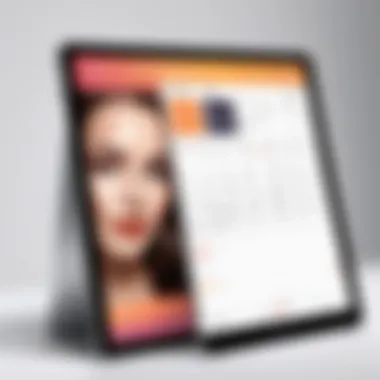Streamlining Salon Booking Systems for Success


Industry Overview
The beauty industry has undergone significant digital transformation in recent years. Particularly noteworthy is the increased demand for salon booking systems that ease appointment scheduling and provide a seamless customer experience. With consumers becoming ever-busier and expectations on convenience rising, salons must adopt technology that keeps pace with these evolving needs.
Current Trends in the Industry-specific Software Market
The shift towards online and mobile booking solutions is at the forefront of the salon software landscape. Salons are leaning more into systems that allow clients to book appointments at their convenience, whether from a desktop or a mobile device. This flexibility has become a cornerstone of customer satisfaction.
Another emerging trend is the integration of artificial intelligence tools. These systems provide personalized recommendations, enhancing customer interaction and encouraging loyalty. For example, some software can send automatic reminders and offer suggestions based on a client’s previous appointments, thus enriching the overall salon experience.
Key Challenges Faced by Buyers in the Industry
Navigating this crowded marketplace can be a daunting task. Salon owners often face challenges like:
- Overabundance of Choices: The sheer number of software solutions can be overwhelming, leading to indecision.
- Integration Issues: Many existing salon systems are outdated, making integration with new tools complicated.
- Hidden Costs: Some systems come with unexpected fees that can balloon the budget.
Despite these challenges, the benefits that a robust booking system can provide often outweigh the obstacles in the selection process.
Emerging Technologies Impacting the Industry
Innovations like blockchain for secure data handling and augmented reality for virtual consultations are slowly making their way into the salon industry. These technologies not only enhance operational security but also help businesses stand out in a competitive market. For instance, a salon that uses AR to showcase styles or techniques can offer a unique experience that many clients find appealing, creating a buzz around their services.
Embracing technology is no longer optional for salons aiming to thrive; it is crucial for survival in this competitive market.
Top Software Options
Choosing the right salon booking system means sifting through a host of providers. Let's examine prominent options available today.
Review of Leading Software Providers in the Industry
Several key players dominate the space in salon booking systems:
- Square Appointments: Known for its user-friendly interface and seamless payment integration.
- Fresha: Offers a robust scheduling platform with commission-free payment processing.
- Vagaro: This software provides extensive marketing tools alongside traditional booking features.
Each of these systems caters to different aspects of salon management, offering features that can streamline operations and enhance customer interactions.
Feature Comparison of Top Software Solutions
When comparing these software options, consider the following features:
- Online Booking: Essential for today’s consumer.
- Client Management: Keep track of appointments and customer preferences.
- Reports and Analytics: These tools enable data-driven decisions.
Pricing Structures of Different Software Options
Understanding the cost implications is key:
- Square Appointments: Free for individuals and a flat fee per month for teams.
- Fresha: No upfront costs, though it offers additional paid features.
- Vagaro: A tiered pricing model that scales with business needs.
Selection Criteria
Identifying the right booking system involves careful consideration.
Important Factors to Consider When Choosing Software
Consider factors like:
- User Experience: How intuitive is the system?
- Support and Training: Does the vendor provide adequate customer support?
- Scalability: Can the system grow with your business?
Common Mistakes to Avoid During the Selection Process
It’s easy to overlook key aspects. A few common pitfalls include:
- Jumping Without Research: Not testing the software can lead to regrets.
- Ignoring Reviews: Too often, firsthand experiences from peers are disregarded.
How to Determine the Right Fit for Your Business Needs
Align your selection with your unique business model. Conducting a needs assessment helps clarify what features are absolutely necessary.
Implementation Strategies
Once the right software has been chosen, the next step is implementation.
Best Practices for Smooth Implementation of Software Solutions
A strategic approach can alleviate many headaches:
- Develop a Rollout Plan: Close planning is crucial.
- Involve Staff Early: Getting team buy-in ensures smoother adoption.
Integration with Existing Systems and Processes
Ensure any new platform can work well with current systems, such as POS or customer databases. Compatibility is key to reducing friction during transition.


Training and Support Resources for Successful Deployment
Investing in training your staff can bolster overall team confidence in using the new software, while utilizing vendor support ensures any technical issues can be resolved swiftly.
Future Trends
Keeping an eye on future changes in the industry can guide long-term strategy.
Predictions for the Future of the Industry-specific Software Landscape
Expect more automation, where AI tools handle bookings, reminders, and even customer interaction to a degree. This will save valuable time for salon staff.
Upcoming Technologies Shaping the Industry
Technologies like cloud computing will enable seamless access to data from anywhere, which could be game-changing, especially in multi-location salons.
Recommendations for Future-Proofing Your Technology Stack
Build flexibility into your systems to adapt to upcoming changes, ensuring you remain competitive. Keeping your tech stack updated is crucial to adapting to the ever-evolving beauty landscape.
Understanding the Need for a Booking System
In today’s fast-paced world, where time is money and convenience reigns supreme, the demand for effective ways to manage appointments has never been greater. A booking system is no longer a luxury but a necessity for salons looking to thrive in a competitive market. By understanding this need, salon owners can both optimize their operations and enhance the customer experience, leading to increased satisfaction and loyalty.
Definition and Purpose of a Booking System
A booking system, in essence, serves as an electronic tool designed to manage customer appointments efficiently. It automates the scheduling process, reducing the mundane tasks that eat up valuable time. Think of it as a digital secretary who not only keeps track of your appointments but also improves communication between clients and staff.
The primary purpose of a booking system is to streamline the appointment process. Instead of the chaotic back-and-forth were phone calls, texts, and potential mix-ups, clients can easily view available time slots and book their desired services online. This functionality not only simplifies the process but also helps salons maintain an organized calendar, reducing the risk of overbooking or leaving time unutilized. By integrating a booking system, salons can not only increase their efficiency but also enhance their professional image, something every salon desires.
Importance in the Salon Industry
The salon industry, while vibrant and full of potential, operates under strict time constraints. With numerous clients demanding attention, having an efficient booking system can be the difference between operating smoothly or spiraling into chaos. Here are a few critical points that highlight the importance of implementing such a system:
- Customer Convenience: Clients appreciate the ability to book appointments at their convenience without the hassle of making calls during crowded hours. The ease of online booking caters to a busy lifestyle, making it more likely they will return.
- Time Management: A well-implemented booking system allows salon staff to allocate their time efficiently. This means more services can be rendered in a day, directly impacting revenue.
- Data Management: Keeping track of clients' preferences, history, and feedback becomes achievable with a digital system. This personalized approach fosters loyalty and enhances overall client satisfaction.
- Marketing Opportunities: Many booking systems come with integrated marketing tools, allowing salons to send promotions, reminders, and updates directly to clients, increasing engagement.
- Maximized Revenue: Ultimately, less time spent on scheduling means more time spent on providing services, which can lead to higher revenues and retention rates.
"Booking systems transform chaos into order, empowering salons to provide a seamless experience for both customers and staff."
In summary, understanding the necessity of a booking system in the salon setting is key for enhancing the overall business operations and customer satisfaction. Those who embrace this technology pave the way for smoother day-to-day operations, client loyalty, and ultimately, sustainable growth.
Key Features of Modern Booking Systems
In today’s digital landscape, the salon industry thrives on convenience and efficiency. Hence, modern booking systems are not just fancy bells and whistles; they’re fundamental tools that can make or break a customer experience. By providing a seamless approach to schedule appointments, these systems address the specific needs of both clients and salon operators. The right features can enhance customer satisfaction, streamline the workflow, and increase overall profitability for the business.
User-Friendly Interface
A user-friendly interface is paramount in any booking system. Imagine a client stumbling through a confusing portal trying to book a simple haircut; it’s likely they won’t return. A straightforward layout, with clear navigation elements, encourages users to explore services without a hassle.
Moreover, an intuitive design nurtures a positive experience, reducing the chances of appointment mishaps. For instance, if a system allows for quick re-booking of previous appointments with just a few clicks, it saves time and builds client loyalty. The ability to easily access client history and preferences further personalizes the experience.
Mobile Compatibility
In our fast-paced world, people are glued to their smartphones. Thus, mobile compatibility is no longer optional; it’s essential. Clients need to access booking systems on-the-go, whether they're on their daily commute or sipping coffee at a café. A system that functions seamlessly across devices not only enriches the user experience but also captures a broader audience.
For better engagement, systems can leverage mobile technology for instant updates, allowing clients to book or change appointments any time they please. The importance of this feature transcends mere convenience—it's about meeting customers where they are. Studies have shown that businesses with strong mobile capabilities see higher customer retention rates.
Customizable Appointment Slots
Every salon has its unique rhythm. Customizable appointment slots enable businesses to adapt to their specific needs. Features that allow salons to have varied durations for different services offer flexibility. For example, a haircut may only need 30 minutes, while a complex coloring job might require an hour or more.
By providing options for slot lengths, salons can optimize their scheduling and avoid wasted time between appointments. Salons also benefit from tailored features such as buffer times, which can be crucial for ensuring that stylists have adequate breaks or time to prepare for the next client. This adaptability can help in managing busy days effectively.
Automated Reminders and Notifications
Automated reminders and notifications are a game changer in the service industry. They serve as invaluable tools for minimizing no-shows and keeping the appointment calendar full. A good booking system will allow salons to send reminders via text or email a day before the appointment, with another prompt on the day itself.
This proactive approach not only shows clients their importance but also enhances operational efficiency. For instance, if a client forgets an appointment, a simple reminder can encourage them to keep it or reschedule without a hassle. Additionally, these systems can notify clients of special promotions or new services, creating a dynamic interaction that could lead to increased business.
"In a world where every minute counts, automated systems simplify tasks that no one wants to handle manually."
All of these features—user-friendly design, mobile functionality, customizable slots, and automation—form the backbone of modern salon booking systems. By investing in these key elements, salon owners set the stage for sustained growth and improved customer experiences.
Integrating Payment Processing
Integrating payment processing into salon booking systems is more than just a trend; it's a fundamental shift that enhances operational fluidity and reinforces the customer experience. In an age where convenience is king, the ability to process payments seamlessly directly affects customer satisfaction and, consequently, revenue generation. It is essential for salon owners to understand both the advantages and the considerations that come with adopting these systems in a competitive landscape.
Seamless Transactions
In the Salon industry, “time is money” couldn’t ring truer. Clients expect swift, smooth transactions that do not disrupt their busy schedules. A booking system that integrates payment processing facilitates seamless transactions, allowing customers to pay at their convenience—whether booking through an app or website. Here are a few significant elements:
- Quick Payment Options: With features like tap-to-pay and mobile wallet compatibility, salons can cater to the preferences of today’s tech-savvy clientele.
- Reduced Wait Times: When clients can pay before leaving, it cuts down the check-out process, making it quicker for everyone involved.
- Error Reduction: Automated systems minimize the chance for clerical errors that often come with manual payments.


In practical terms, this means more satisfied customers who will likely return—content with their experience and the ease of payment. As we all know, happy clients can become repeat clients.
Invoicing and Record Keeping
With integrated payment processing, salons enjoy a substantial improvement in invoicing and record-keeping practices. Gone are the days of scribbled receipts or misplaced invoices. An effective booking system offers features such as:
- Automated Invoicing: Clients receive immediate invoices via email or SMS upon transaction completion, ensuring they have a record of services rendered.
- Centralized Financial Records: All transactions are stored within the same system, allowing easier access to historical data. This directly influences tax preparations and financial audits.
- Payment Tracking: Salons can keep track of pending and completed payments effortlessly, which helps in managing cash flow and planning for future investments.
By streamlining invoicing and record-keeping, salons not only become more professional but also significantly reduce administrative burdens.
Overall, the integration of payment processing is a key feature that provides numerous benefits, enhancing the overall efficiency of salon operations. This investment in technology ultimately leads to a better customer experience, strengthened client relationships, and a healthy, thriving business environment.
Benefits of Implementing a Booking System
The implementation of a robust booking system is not merely a tactical decision but a strategic imperative that permeates various aspects of salon operations. In an age where customer expectations are evolving rapidly, salons need a sophisticated approach to manage appointments, track client preferences, and streamline daily tasks. This section highlights the core benefits of employing a booking system, examining how these advantages contribute to the overall functionality and satisfaction within the salon environment.
Enhanced Customer Experience
When clients step into a salon, they seek not just services, but an experience—an experience that begins the moment they schedule an appointment. A modern booking system facilitates this by providing intuitive interfaces that allow clients to book appointments without hassle. Imagine a scenario where a client can easily select their preferred services, check availability, and secure a time slot—all from the comfort of their couch, perhaps with a cup of coffee in hand.
The ease of booking leads to higher client satisfaction rates. Automated reminders sent via text or email help minimize no-shows and ensure clients arrive prepared. Such proactive communication also conveys a sense of professionalism that builds trust. It’s like saying, "We care about your time; let’s make this as seamless as possible.” Thus, not only do booking systems eliminate the confusion surrounding appointments, but they also enhance the overall atmosphere, making clients feel valued.
Improved Operational Efficiency
Delving into operational metrics, the benefits of booking systems become even clearer. By automating scheduling tasks, salons can significantly reduce administrative burdens. As busy salon managers juggle countless responsibilities, having a system in place to handle bookings means they spend less time on the phone or managing spreadsheets. This efficiency leads to a better allocation of resources—both human and financial.
Additionally, booking systems often integrate other salon operations. This might include staff management, inventory tracking, and customer relationship management. With everything interconnected, salon owners gain a holistic view of their business, allowing for informed decisions based on real-time data. In this light, automated reports generated by the system give insights into peak times, popular services, and even employee performance, facilitating smarter operational strategies.
Revenue Growth and Customer Retention
A booking system does not merely streamline existing functions; it opens avenues for growth. By analyzing booking trends and customer behaviors, salons can tailor services to meet client demands. For instance, if a system shows an uptick in requests for skincare treatments, salons can respond by enhancing their product offerings or training staff accordingly. This adaptability is crucial in retaining clients who seek personalized experiences.
Moreover, a well-implemented booking system can offer promotions directly through the platform, encouraging upsells and fostering loyalty. For instance, offering a discount on a second service when booked alongside a haircut can encourage clients to explore more services, driving overall revenue. Furthermore, the data collected aids in crafting loyalty programs that resonate with clients’ preferences, leading to repeat visits—an essential factor for long-term success.
In essence, the financial implications of implementing a booking system extend beyond initial investments; they encompass increased client satisfaction, streamlined operations, and a focused approach to capturing growth opportunities.
Through these benefits, it’s evident that the adoption of a booking system is not a luxury—it's an essential component of a thriving salon business.
Challenges in Managing Salon Bookings
In the dynamic realm of the salon industry, managing bookings can often feel like walking a tightrope. With numerous elements at play—from client needs to staff availability—challenges inevitably arise. This section explores the hurdles of handling appointments effectively, highlighting how overcoming these obstacles can significantly enhance both client satisfaction and operational fluidity within a salon.
Overbooking and Underbooking Issues
Overbooking and underbooking present a dual-edged sword for salon managers. On one hand, overbooking can lead to short-term revenue boosts but often at the cost of customer satisfaction and employee morale. Imagine a bustling Saturday morning where a salon just can’t turn clients away. As a result, they pack appointments tighter than a sardine can, leading to frustrated clients and frazzled staff. A well-managed schedule would have to account for the time each service demands, ensuring ample room for unexpected delays.
On the flip side, underbooking represents a missed opportunity. Salons with lax scheduling may find themselves sitting on empty chairs, leaving money on the table. This often comes from not accurately forecasting busy times or failing to optimize staff hours for peak demand. To tackle this issue, salon management must embrace robust booking systems that provide analytics and insights on client trends, allowing for better forecast and planning.
Consider the advantages of an efficient booking process:
- Time Management: Superior control over appointment slots means every stylist can utilize their time effectively.
- Client Satisfaction: Clients appreciate not waiting endlessly. Happy clients return, and word-of-mouth spreads.
- Revenue Optimization: Maximize bookings without sacrificing quality through smart scheduling techniques.
Staying Updated with Client Preferences
Understanding and adapting to client preferences is another challenging aspect of salon booking management. Today's clients expect a personalized experience that reflects their unique needs. Failing to track preferences can lead to dissatisfaction and even loss of clientele. A client who regularly prefers a specific stylist or has particular service requests should never be met with mere guesswork.
Utilizing a booking system that allows for client profiles can makes a world of difference. Having detailed records of previous services, preferences, and even notes about conversations ensures that each appointment feels tailor-made. For instance, if a client always opts for a particular hair treatment or requests a specific ambiance, the salon can proactively cater to these needs, fostering loyalty and trust.
"The secret to retaining clients lies in understanding their individual wants and needs—like a pat on the back from a trusted friend."
Updating client records regularly is essential. Simple reminders for staff to note any changes after each appointment can transform the level of service provided. Moreover, using automated feedback requests following appointments can keep lines of communication open, ensuring that any shifts in preferences are swiftly captured.
In summary, the challenges associated with managing salon bookings—whether it's overbooking or staying updated on client preferences—demand astute management and the right tools. By learning to navigate these obstacles effectively, salon owners can foster a thriving environment that not only satisfies clients but also boosts their business significantly.
Evaluating Different Booking Systems
Evaluating different booking systems is a crucial part of the decision-making process for salons. With numerous options available on the market, the right choice can make a noticeable difference in how smoothly operations run. It's not merely about having a system in place but selecting one that fits the unique demands of the business. This section examines specific elements, benefits, and considerations vital to this evaluation.
Comparative Analysis of Popular Solutions
When it comes to choosing a booking system, there's a plethora of platforms out there, each boasting its own set of features. Some of the more renowned options include Square Appointments, Acuity Scheduling, and Fresha.
Each tool has strengths and potential drawbacks, resulting in a varied landscape:
- Square Appointments: Known for its intuitive interface, it's excellent for small to medium-sized businesses. It offers integrated payments and effortless calendar synchronization.
- Acuity Scheduling: This one shines when it comes to customization. If your salon offers a wide range of services, Acuity has sophisticated scheduling options that can accommodate complex appointment types.
- Fresha: A go-to for salons on a budget, offering many features for free, but users may find some premium tools limited.
Analyzing these options helps salon owners distinguish what’s most relevant for their specific needs, whether it’s simplicity, adaptability, or cost-effectiveness.
Criteria for Selection
The criteria used to select the right booking system can vary significantly from one salon to another. However, there are several fundamental aspects worth considering:
- Ease of Use: This should be paramount. If both staff and clients find it clunky, it can lead to frustrations and ultimately loss of business.
- Integration Options: A system that works well with existing tools like email marketing or accounting software can streamline many processes.
- Scalability: As a business grows, the booking system should easily accommodate that growth.
- Customer Support: Choose one that offers solid support. Whether it’s quick troubleshooting or in-depth guidance, timely help is invaluable.


Having a definitive criterion can help make the selection process much clearer, ensuring salon owners focus on what matters most to their operations.
Customer Reviews and Case Studies
Customer feedback provides invaluable insights not just about how systems perform, but how they impact daily operations. Reviews on platforms like Reddit and Facebook often provide real-world examples that spotlight specific strengths and weaknesses of various systems. Here’s how to utilize this information effectively:
- Search for both positive and negative experiences to understand what works and what does not.
- Look out for reviews that highlight customer service experiences, system downtime, or ease of updates.
- Consider case studies of salons that have made the switch from one system to another. Their insights can highlight potential pitfalls or unexpected gains.
"Before switching to Square, we lost track of appointments regularly. Now, booking is a breeze!"
This kind of firsthand experience can guide potential users in making well-informed decisions about which system fits their needs best.
In summary, evaluating different booking systems requires a detailed analysis of popular solutions, a clear criterion for making selections, and an in-depth look at customer experiences. This thorough approach not only aids in selecting the right system but also ensures that the chosen solution supports the salon's growth and enhances operational efficiency.
Future Trends in Salon Booking Technology
As the beauty industry continues to evolve, the importance of future trends in salon booking technology remains paramount. These developments not only influence customer interactions but also reshape the operational landscape for salon owners. Keeping an eye on emerging technologies helps create tailored experiences for clients and streamlines processes, thereby enhancing overall efficiency. To remain competitive, salon owners must adapt to new tools and explore how they can best serve their clientele while addressing common operational challenges.
AI and Machine Learning Integration
The integration of artificial intelligence (AI) and machine learning is poised to revolutionize the salon booking experience. By leveraging data analytics, salons can gain insights into customer behaviors, preferences, and trends. This assists in creating a more personalized approach to service delivery.
For instance, by analyzing historical appointment data, a salon can predict peak times and optimize scheduling accordingly. Imagine a system that knows when your regular clients usually book their appointments and sends them tailored reminders or special offers around those times. The predictive capability of AI not only enhances customer experience but also improves resource allocation for salon operations.
Moreover, machine learning algorithms can categorize clients based on their service preference, such as color treatments or skincare routines, enabling more targeted marketing efforts. Consider this: while a stylist may perform multiple services, understanding which service draws in more clients could lead to optimized promotional strategies. This targeted engagement can result in a substantial boost in client retention and satisfaction.
Personalization and Client Engagement
Personalization is no longer just a nice-to-have; it’s increasingly becoming a necessity in salon management. Customers today seek experiences catered to their specific needs. This applies not only to the services they receive but also to how they interact with salon booking systems.
With modern booking solutions, salons can offer personalized portals where clients manage their preferences, view past appointments, and customize their future bookings. Additional features like wish lists for services can enhance user experience.
Furthermore, client engagement can be significantly improved through tailored communications. For example, sending personalized birthday offers or follow-up messages after a service fosters a sense of connection and care. The importance of building a relationship with clients through considerate engagement cannot be overstated.
"Personalizing client interactions is like nurturing a garden; with the right care and attention, it blooms into long-lasting relationships."
Integrating these future trends can lead to noteworthy benefits:
- Improved Client Loyalty: Happy clients are more likely to return.
- Higher Revenue Streams: Personalized recommendations often lead to upselling opportunities.
- Enhanced Reputation: Salons that embrace cutting-edge technology are often seen as industry leaders.
By focusing on AI integration and personalization, salon owners can transform not just how they manage bookings, but also their overall client relationships. In a competitive marketplace, these advancements position salons not just as service providers, but as trusted partners in the beauty journey of their clients.
Case Studies of Successful Implementations
The role of case studies in understanding salon booking systems cannot be understated. They serve as a window into the practical applications of various systems, illustrating not just the features but the real-world benefits and challenges businesses face. For salon owners and decision-makers, reviewing these instances can shed light on the potential return on investment, operational improvements, and customer satisfaction rates.
Observing how different salons have adopted and adapted to booking systems can be instructive. An experienced salon owner or a budding entrepreneur can draw lessons from both successes and pitfalls highlighted in these narratives.
Small Salons vs. Larger Chains
The contrast between small salons and larger chains offers fascinating insights into how booking systems are utilized. Smaller salons often operate with more flexibility but may lack the resources to invest heavily in sophisticated systems. Despite this, many have embraced simple yet effective booking software that integrates client reminders and promotions, allowing them to maintain a personal touch that larger chains may struggle to replicate. For instance, a quaint salon in a suburban area can leverage its intimate setting to foster strong client relationships through personalized appointment suggestions.
On the flip side, larger chains are often faced with the challenge of standardizing services across multiple locations. Their booking systems need to handle a higher volume of clients and integrate seamlessly with various other management tools, such as inventory and payroll systems. A particular chain might implement a centralized booking system that allows clients to book appointments online, see stylist availability in real-time, and make payments digitally—all in one go. This not only improves efficiency but also ensures a uniform customer experience across its branches.
"Real-world applications of salon booking systems highlight how tailored solutions can enhance both service delivery and customer satisfaction."
Quantitative Outcomes
Measuring the success of a booking system can often be couched in numbers. Quantitative outcomes derived from implementing these systems can vary widely based on salon type, size, and customer demographics. For instance, a small salon that introduced an online booking feature might see a 30% increase in appointments within the first quarter, driven largely by the convenience it offers to clients. Conversely, a large chain may focus on metrics such as reduced no-show rates or increased average transaction value per customer.
Alongside appointment volume, looking at customer retention rates post-implementation can provide clearer insights. A case study might reveal that salons using automated reminders effectively reduced no-shows by 25%, directly translating to higher revenue. Likewise, understanding the average client spend can uncover trends about how booking systems influence upselling or cross-selling services.
Ultimately, the data gathered from these case studies not only assists in evaluating existing booking systems but can also guide future investments. By analyzing what works well in diverse situations, salon owners can refine their approach to client management, leading to more informed and strategic decisions in their businesses.
End
In this ever-evolving landscape of salon booking systems, it’s paramount to recognize how pivotal a well-designed appointment system can be. Not just merely a tool for setting appointments, it's a comprehensive solution intertwined with the core operations and client interactions of any salon. The importance of this topic lies in several essential elements:
- Enhanced Client Experience: A seamless booking process elevates customer satisfaction significantly. By minimizing wait times and offering user-friendly options, salons create a nurturing environment that encourages repeat business.
- Operational Efficiency: An effective booking system reduces the chaos that often accompanies managing appointments. It streamlines staff schedules, optimizes time management, and ultimately leads to improved service delivery.
- Data-Driven Decisions: Today's modern systems gather invaluable data regarding client preferences and booking patterns. This wealth of information empowers salon owners to make informed decisions that enhance service offerings and marketing strategies.
As we summarize the key insights, it’s clear that investing in an efficient booking system is not just about technology but about laying the groundwork for a robust business model that adapts to changing client expectations.
Summarizing Key Insights
Reflecting on the broader narrative, several key takeaways emerge:
- Cutting-edge Features: The integration of mobile compatibility, automated reminders, and customizable appointment slots makes modern booking systems indispensable.
- Financial Implications: Balancing charges with customer retention strategies can lead to sustained revenue growth.
- Overcoming Challenges: Understanding how to navigate the hurdles, like overbooking or mismanagement of client data, is crucial for long-term success.
Through thorough evaluations of popular solutions and their functionalities, decision-makers in the salon industry are better positioned to choose systems that fulfill their distinct needs.
Future Outlook for Salon Booking Systems
Looking ahead, salon booking systems are poised for fascinating developments that may continue to shape the beauty industry:
- Artificial Intelligence Acceptance: As AI tools become more integrated, salons can expect smarter scheduling, predictive analytics on customer preferences, and even real-time inventory management.
- Heightened Personalization: Future systems will likely emphasize tailored client experiences, allowing salons to engage customers on a one-to-one basis by analyzing their behavior patterns and preferences.
The future is bright for those who grasp the nuances of these systems. The potential for growth and innovation within salon booking technology can enhance customer loyalty and streamline operations, aligning perfectly with the evolving expectations of the modern-day client. As these trends unfold, adapting to what technology offers becomes less a challenge and more an opportunity for continued success in a competitive space.
"In the world of salon booking, staying a step ahead can make all the difference between a thriving business and one that struggles to keep up."
By understanding these insights, salon owners can position themselves to harness these advancements effectively, ensuring that their businesses remain relevant and competitive in the beauty industry.



